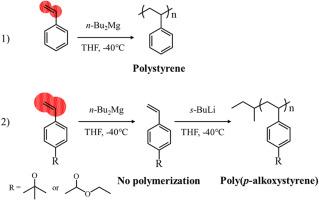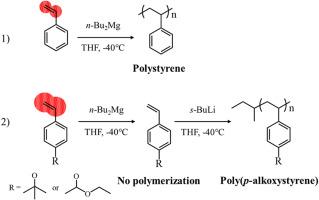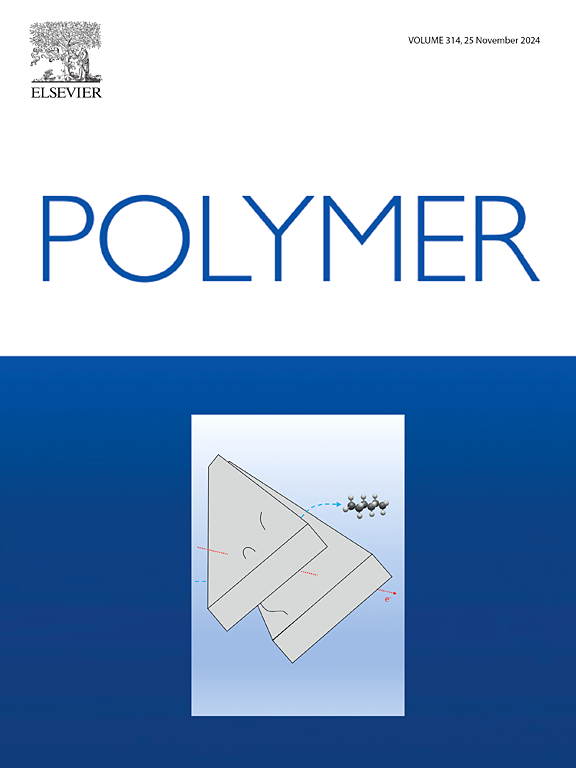在二正丁基镁存在下通过阴离子聚合合成定义明确的聚对烷氧基苯乙烯
IF 4.1
2区 化学
Q2 POLYMER SCIENCE
引用次数: 0
摘要
本研究证明了引入二正丁基镁(n-Bu2Mg)添加剂的必要性,以通过对烷氧基苯乙烯单体在 -40°C 下的阴离子聚合合成精确控制的聚合物。在不使用添加剂的情况下,使用仲丁锂(s-BuLi)在四氢呋喃(THF)溶剂中聚合 4-叔丁氧基苯乙烯(BSt)和 4-(1-乙氧基乙氧基)苯乙烯(EESt),得到的分子量分布(MWD)为 1.36。然而,在加入比 s-BuLi 多 30 多倍的 n-Bu2Mg 后,分子量分布被严格控制在 1.05-1.06 之间,从而获得了精确设计的分子量。因此,n-Bu2Mg 能有效抑制舒伦克反应器在-40℃聚合温度下可能发生的副反应。有趣的是,即使不使用 s-BuLi,将正-Bu2Mg 混合在 THF 溶剂中,在-40°C 温度下,苯乙烯单体的聚合反应也能长时间进行。这一结果表明,尽管 n-Bu2Mg 是一种弱阴离子引发剂,但与 BSt 或 EESt 相比,由于苯乙烯双键的电子密度较低,因此 n-Bu2Mg 可以引发聚合反应。 基于这些结果,在苯乙烯和 EESt 混合单体中加入 n-Bu2Mg 后 20 秒内,用 s-BuLi 引发聚合反应,即可合成分子量分布较窄的精密共聚物。本文章由计算机程序翻译,如有差异,请以英文原文为准。


Synthesis of well-defined poly(p-alkoxystyrene) by anionic polymerization in the presence of di-n-butylmagnesium
This study demonstrates the necessity of introducing di-n-butylmagnesium (n-Bu2Mg) additives to synthesize precisely controlled polymers through anionic polymerization of p-alkoxystyrene monomers at −40 °C. Without additives, 4-tert-butoxystyrene (BSt) and 4-(1-ethoxy ethoxy) styrene (EESt) are polymerized using sec-butyllithium (s-BuLi) in tetrahydrofuran (THF) solvent, yielding a molecular weight distribution (MWD) of 1.36. However, the MWD is strictly controlled to 1.05–1.06 after adding n-Bu2Mg in more than 30 times the amount of s-BuLi, resulting in an accurately designed molecular weight. Therefore, n-Bu2Mg effectively suppresses side reactions that could occur at the polymerization temperature of −40 °C in the Schlenk reactor. Interestingly, the polymerization reaction of styrene monomer proceeds when n-Bu2Mg is mixed in THF solvent at −40 °C for an extended period, even without s-BuLi. This result suggests that, despite being a weak anionic initiator, n-Bu2Mg can initiate polymerization due to the lower electron density of the styrene double bond compared to BSt or EESt. Based on these results, a precise copolymer with a narrow molecular weight distribution can be synthesized by initiating polymerization with s-BuLi within 20 s of adding n-Bu2Mg to the mixed monomers of styrene and EESt.
求助全文
通过发布文献求助,成功后即可免费获取论文全文。
去求助
来源期刊

Polymer
化学-高分子科学
CiteScore
7.90
自引率
8.70%
发文量
959
审稿时长
32 days
期刊介绍:
Polymer is an interdisciplinary journal dedicated to publishing innovative and significant advances in Polymer Physics, Chemistry and Technology. We welcome submissions on polymer hybrids, nanocomposites, characterisation and self-assembly. Polymer also publishes work on the technological application of polymers in energy and optoelectronics.
The main scope is covered but not limited to the following core areas:
Polymer Materials
Nanocomposites and hybrid nanomaterials
Polymer blends, films, fibres, networks and porous materials
Physical Characterization
Characterisation, modelling and simulation* of molecular and materials properties in bulk, solution, and thin films
Polymer Engineering
Advanced multiscale processing methods
Polymer Synthesis, Modification and Self-assembly
Including designer polymer architectures, mechanisms and kinetics, and supramolecular polymerization
Technological Applications
Polymers for energy generation and storage
Polymer membranes for separation technology
Polymers for opto- and microelectronics.
 求助内容:
求助内容: 应助结果提醒方式:
应助结果提醒方式:


